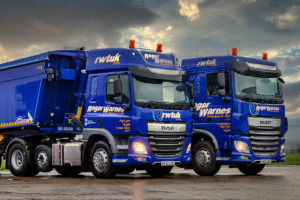
Many hauliers have such contracts in place with tyre specialists and manufacturers, covering a range of areas such as fitment, pressure monitoring, as well as monthly fleet tyre checks and reports.
For example, Norfolk-based Roger Warnes Transport recently extended its 13-year relationship with Prometeon Tyre Group that covers the entire 222‐strong fleet – consisting of 108 trucks and 114 trailers – on a fixed pence per kilometre (PPK) contract.
Delivering across the UK, and with customers ranging from sugar beet and animal feed producers to glass manufacturers and local farmers, the entire fleet records an annual mileage of 8.6 million kilometres.
Under the PPK deal, Prometeon’s Pirelli-branded tyres are used on trucks that navigate rough tracks that might consist of uneven material such as flint or even seashells.
They are equally suitable for regional deliveries that might involve a long run up the M62 from Norfolk and across to Leeds with a full load of sand.
Ian Barclay, Operations Director at Roger Warnes Transport said: “We’ve always had a PPK deal with Prometeon, it suits the way we operate. Effectively, Prometeon owns the tyre and we pay a monthly fee based upon our usage.
“It takes away any nasty shocks because we know the upfront price that we’ll be paying, irrespective of whether there is damage or wear and tear.”
Meanwhile, Esken Renewables, the UK’s largest supplier of biomass fuel, has switched more than three quarters of its fleet to Michelin X Multi and X Works tyres, cutting fuel costs and reducing downtime, via a contract with Michelin’s Services & Solutions division.
The Widnes-based company, which has long-term contracts to supply 1.7 million tonnes of fuel to biomass plants, has 123 trucks and 150 trailers and each of its vehicles clocks up about 100,000 km per annum.
Its decision to equip the mixed fleet with tyres from Michelin in a three-year PPK deal came about with the company’s development of its ESG strategy.
Esken Renewables is trialling Michelin Connected Fleet’s Tyre Pressure Monitoring System (TPMS), on its trailers, with a view to rolling the technology out across the entire fleet in the coming months.
In addition, it is working closely with Michelin on an education programme for the company’s transport operations team and its drivers to reduce call-out costs and limit tyre damage.
Joe Sweeney, Esken Renewables’ Fleet and Engineering Manager, said that TPMS gives users an “early warning” on issues such as punctures and vehicle braking system compliance, while allowing drivers to quickly assess tyre pressures from their cabs.

Midlands-based Collins Earthworks, moves heavy plant equipment, transports construction supplies and removes waste, meaning the tyres continuously travel on rough and sharp surfaces.
The haulier uses fleet service provider Tyre Maintenance (TM), which sees Continental’s CrossTrac steer, drive and trailer tyres fitted exclusively to its haulage fleet of more than 100 vehicles.
Collins operates a very strict service policy, which keeps the tyres within their optimal window of performance and staff from TM also advise if there is anything else the haulier could be doing to the running on its trucks to maximise tyre longevity and performance.
Richard Williams, Workshop Manager, said: “Due to the size of the business, it makes sense for us to look after our own maintenance – TM is our tyre retailer.
“We do, on occasion, utilise their fitting service at our other depot when we’re particularly busy. It’s always brilliantly managed and carried out perfectly – a lifeline, especially considering the shortage of tyre fitters.”
Also, Felixstowe, Suffolk-based container haulier VKVP Haulage has chosen Bridgestone for a fleet partnership, covering new tyres, retread tyre replacements and reporting systems.
All its drive and lift axles on trailers are fitted with Bridgestone retread products using the franchised network of Bandag dealers, with the life of every tyre maximised through audits, reports and tyre care husbandry.
VKVP utilises the FleetBridge reporting system, which offers full transparency on the condition of every tyre fitted to every vehicle.
FleetBridge automates tailor-made workflows between VKVP, Bridgestone Partner dealers and Bridgestone’s own fleet administration, which saves time in the tyre management process.
Neil Collison, Bridgestone’s National Fleet Executive, said: “We were able to demonstrate that our premium tyre range and line of Bandag retread products offer great longevity, while our breakdown response times via the Bridgestone Partner network were seen as another compelling factor.
“We proved that we can be on hand to support them 24 hours a day, seven days a week and can be an extension of their business which will be there for them at all times.”
NEP UK, a provider of outside broadcasting and media production, which runs HGVs, trailers and vans, receives a full tyre maintenance package from Tructyre including supply, fit, maintenance, and emergency support.
Justin Readings, NEP Head of Transport, said staff from Tructyre go the extra mile to make sure that NEP’s monthly fleet check is completed, replacement tyres are readily available, and wheel torques are logged and completed in full, as per its company requirements.
“The manager has helped us with some countrywide issues too, for example, organising urgent delivery and fitment of a tyre for a vehicle we had in Scotland,” Readings said.

However, the environmental benefits are increasingly important to the sector, too, with more companies identifying tyre management contracts as a way to deliver their own green strategies and reduce their carbon footprint.








